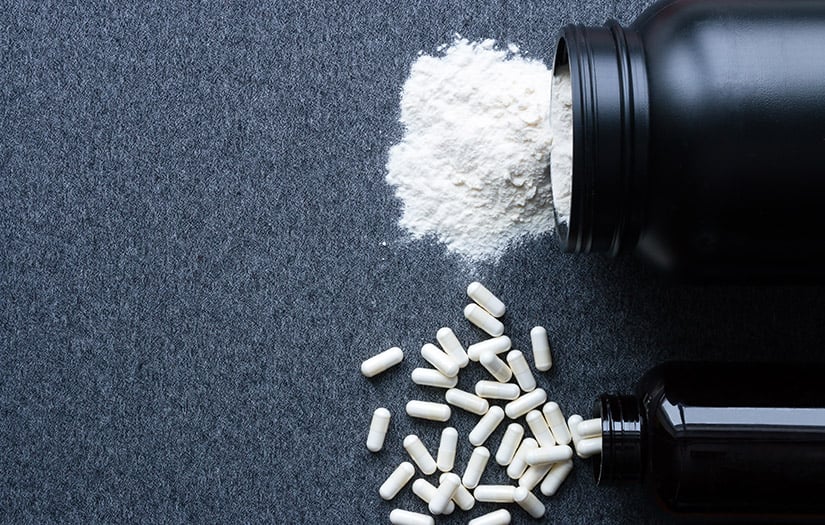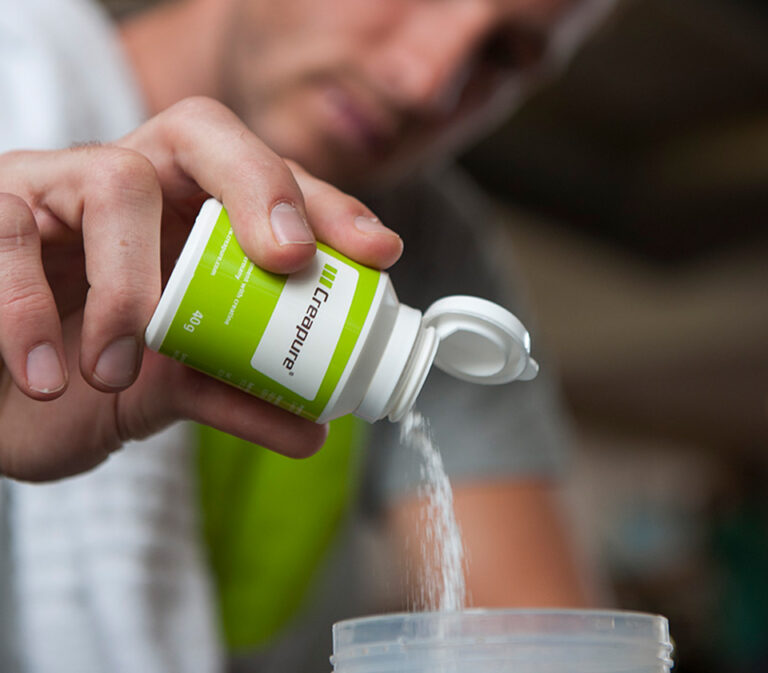Imagine, you’re getting ready for your workout, excited to give it your all. You reach for a glass of your go-to juice, and a thought pops into your head, “Can I mix creatine with my juice to help me perform better?”
Just like me, you’re always looking for ways to boost your exercise routine. You’ve heard that creatine can make your muscles stronger and help you get fitter. But, like me, you might be wondering how to do it safely without any fuss.
However, the answer is Yes, you can mix creatine with juice. Creatine is a popular supplement used by many athletes and fitness enthusiasts to improve exercise performance and muscle growth. It’s often mixed with liquids like juice, water, or a sports drink for consumption.
To do this, simply measure the recommended dose of creatine (usually around 5 grams) and mix it thoroughly with your chosen juice. Some people prefer to mix it with a flavored juice to mask the slightly bitter taste of creatine, as it doesn’t dissolve completely and can settle at the bottom of the glass. Stirring or shaking the mixture well before drinking can help ensure you get the full dose.
Remember to follow the recommended dosage instructions for creatine and consult with a healthcare professional or a fitness expert if you have any concerns about its usage or potential interactions with other supplements or medications you may be taking.
What Is Creatine?

Creatine is a natural compound found in small amounts in certain foods and is also synthesized by the body. It plays a crucial role in supplying energy to muscle cells during high-intensity, short-duration activities, such as weightlifting and sprinting. When you supplement with creatine, you increase the body’s creatine phosphate stores, which can enhance performance during these types of activities.
Imagine you’re about to do something physically demanding, like lifting weights or sprinting. Your muscles need a quick and powerful burst of energy to perform at their best. This is where creatine steps in. It’s like the energy booster your muscles call upon when they’re faced with a tough challenge.
Creatine stores energy in your muscles in the form of a molecule called ATP (adenosine triphosphate). When your muscles need a surge of energy, they can tap into this stored ATP, thanks to creatine. This extra energy helps you lift that heavy weight or sprint that last bit faster.
So, in simple terms, creatine is like the “turbo button” for your workouts. It gives your muscles the extra oomph they need for those short, intense bursts of activity. It’s no wonder that people who are into fitness and sports often consider adding creatine to their routines.
Benefits of Combining Creatine and Juice
Combining creatine with juice can offer a range of benefits that make it a popular choice among fitness enthusiasts. Here are some of the advantages of incorporating creatine into your juice consumption:
Improved Taste: Creatine has a slightly bitter taste, which can be unappealing to some people when taken with water alone. Mixing it with juice can mask this taste, making it more palatable. This is especially beneficial for those who dislike the natural flavor of creatine.
Enhanced Absorption: Juice contains carbohydrates, particularly sugars, which can enhance the absorption of creatine in your body. Carbohydrates trigger the release of insulin, a hormone that helps transport creatine into muscle cells, where it’s needed most for performance and recovery.
Hydration: Many juices, such as orange or watermelon juice, are high in water content, aiding in maintaining hydration levels during workouts. Staying adequately hydrated is crucial for overall performance and muscle function.
Nutrient Synergy: Juice is rich in essential vitamins, minerals, and antioxidants, which can complement the benefits of creatine. These nutrients support overall health, help combat oxidative stress, and promote recovery after intense exercise.
Convenience: Mixing creatine with juice is a convenient way to consume your daily creatine dose, especially if you already enjoy drinking juice. It eliminates the need to take additional supplements or pills.
Variety: Juice comes in a wide range of flavors, allowing you to customize your creatine intake. You can choose your favorite juice flavor to make your creatine consumption more enjoyable.
Pre-Workout Energy: Drinking creatine with juice before a workout can provide you with a quick source of energy. This can be particularly beneficial for high-intensity workouts or sports that require short bursts of energy.
Post-Workout Recovery: After a challenging workout, combining creatine with juice can aid in replenishing glycogen stores and promoting muscle recovery. The carbohydrates in juice assist in restoring energy levels and muscle glycogen.
Suitable for Creatine Loading: Some individuals opt for a “loading phase” when starting creatine supplementation, which involves taking a higher dose for the first week. Mixing creatine with juice makes it easier to consume the increased amount.
Customization: You can experiment with different juice types to find the flavor that best complements your creatine. This flexibility allows you to adapt your creatine consumption to your taste preferences.
While there are numerous benefits to mixing creatine with juice, it’s essential to choose the right type of juice, one that is not too acidic, to ensure the effectiveness of the creatine. Additionally, always follow the recommended dosage guidelines for creatine supplementation to achieve the best results while minimizing the risk of side effects.
How to Mix Creatine with Juice Properly
Mixing creatine with juice is a straightforward and effective strategy to enhance your workouts, but it’s vital to do it correctly. First and foremost, choose creatine monohydrate, a widely recognized and safe form of creatine. For most individuals, the recommended daily dose ranges from 3 to 5 grams, and it’s crucial to stick within this range to avoid potential stomach discomfort.
When it comes time to mix your creatine with juice, start by pouring your desired amount of juice into a glass. Then, add the creatine powder. To ensure a smooth blend, stir or shake the mixture vigorously until the creatine is fully dissolved. This step is essential to prevent any unpleasant lumps or clumps in your drink.
Regarding timing, you have some flexibility in choosing when to consume your creatine-infused juice. Many individuals opt to take it immediately after their workout when their muscles are more receptive to absorbing nutrients, potentially amplifying creatine’s benefits.
To maintain a healthy balance, it’s crucial to stay well-hydrated throughout the day, as creatine can cause your muscles to retain water. Adequate hydration not only supports your workouts but also helps prevent potential side effects.
Lastly, patience and consistency are key when it comes to creatine supplementation. While some supplements promise immediate results, creatine may take a few weeks of regular use before you notice significant improvements in your performance and muscle gains.
Dosage and Timing Guidelines for Creatine Supplementation
Creatine is a highly effective supplement for enhancing muscle performance and growth when used correctly. To achieve the best results and ensure safety, it’s essential to follow recommended dosage and timing guidelines.
Dosage Guidelines
Standard Dosage: For most individuals, the standard daily creatine dosage is approximately 5 grams. This is known as the maintenance dose and is suitable for long-term use.
Loading Phase (Optional): Some people choose to do a loading phase when starting creatine supplementation. During the loading phase, you take around 20 grams of creatine per day, divided into four doses of 5 grams each, for the first 5-7 days. This phase helps saturate your muscles with creatine more quickly. However, it’s not necessary, and many individuals achieve the same benefits with the standard dosage over time.
Individual Variations: Dosage may vary based on factors such as body weight, muscle mass, and activity level. Athletes engaged in high-intensity training may consider higher doses, but it’s crucial not to exceed recommended limits.
Consult with a Healthcare Professional: If you have underlying health conditions or concerns, it’s advisable to consult with a healthcare professional or a sports nutritionist before starting creatine supplementation. They can provide personalized recommendations based on your specific needs.
Timing Guidelines
Consistency is Key: Take creatine consistently, whether it’s a workout day or a rest day. Consistent supplementation helps maintain creatine levels in your muscles, maximizing its benefits over time.
Pre-Workout: Many individuals prefer to take creatine shortly before a workout. This timing allows the creatine to be readily available to your muscles when you need it most during exercise. Mixing creatine with juice or water and consuming it 30-60 minutes before your workout is a common practice.
Post-Workout: Taking creatine after a workout is another popular option. This timing can help replenish glycogen stores in your muscles and promote recovery. Mixing creatine with your post-workout shake or juice is convenient and effective.
Anytime During the Day: Creatine can be taken at any time that suits your routine. The key is consistency in daily intake. Some individuals prefer to split their daily dose into two servings, taking one in the morning and one in the evening.
Avoid Mixing with Hot Beverages: Avoid mixing creatine with hot beverages like tea or coffee, as high temperatures can degrade creatine molecules, reducing its effectiveness.
Stay Hydrated: Creatine may increase your body’s need for water, so it’s essential to stay adequately hydrated throughout the day.
Long-Term Use: Creatine is safe for long-term use, and its benefits often become more pronounced with continued supplementation. There’s no need to cycle on and off creatine.
Remember that individual responses to creatine may vary, so it’s essential to monitor how your body reacts and adjust the timing and dosage accordingly. When used as part of a well-rounded fitness and nutrition plan, creatine can be a valuable tool for improving exercise performance and achieving your fitness goals. Always consult with a healthcare professional or fitness expert if you have any concerns or questions about creatine supplementation.
Potential Side Effects and Precautions

While creatine is generally considered safe, it’s essential to be aware of potential side effects and take necessary precautions to ensure a positive experience with this supplement. For some individuals, creatine may lead to mild gastrointestinal discomfort or digestive issues. To minimize the risk of such issues, it’s advisable to adhere to recommended dosages, ensure thorough dissolution of creatine in liquids, and consider taking it with food.
Another aspect to keep in mind is creatine’s potential to cause your muscles to retain water, which can lead to dehydration if you don’t consume enough fluids. Staying adequately hydrated throughout the day is crucial when using creatine.
There have been concerns about creatine’s impact on kidney function, but numerous studies suggest that it is generally safe for individuals with healthy kidney function. However, if you have pre-existing kidney issues or any doubts, consulting a healthcare professional before using creatine is a prudent step.
Creatine may also interact with certain medications or supplements, potentially affecting their effectiveness. If you are taking prescription drugs or other supplements, it’s advisable to consult your healthcare provider to ensure there are no adverse interactions.
Some individuals opt for a loading phase with higher creatine doses initially to saturate their muscles quickly. While this approach can be effective, it may increase the risk of stomach discomfort. Monitoring your body’s response and adjusting your creatine usage accordingly is a sensible approach.
Lastly, the quality of the creatine supplement matters. Ensuring that you purchase creatine from reputable sources is essential to guarantee its purity and safety.
In summary, while creatine offers various benefits for enhancing workout performance and muscle growth, it’s crucial to be mindful of potential side effects and take necessary precautions. By using creatine responsibly, staying well-hydrated, and seeking professional advice when needed, you can minimize potential risks and enjoy the advantages it brings to your fitness journey.
FAQ
Is it better to take creatine with juice or milk?
It’s typically better to mix creatine with juice because it helps with absorption. Juice provides a quick source of carbs, which can enhance creatine uptake. Milk contains protein, which may slow down absorption, so it’s not the ideal choice.
Can I drink juice instead of water on creatine?
While you can drink juice with creatine, it’s still essential to drink enough water throughout the day. Creatine might make your muscles hold onto water, so staying hydrated with water is important for overall well-being.
How can I absorb creatine better?
To absorb creatine better, mix it with a source of carbohydrates like juice. Carbs help transport creatine to your muscles. Also, stay hydrated, and consider splitting your creatine dose throughout the day for optimal absorption.
Can I take 20g of creatine at once?
It’s not recommended to take 20g of creatine at once. The typical dose is 3-5g per day. Taking too much creatine at once can lead to stomach discomfort.
What juice can I mix creatine with?
You can mix creatine with various juices, but simple, non-acidic options like apple or grape juice work well. Avoid highly acidic juices like orange or lemon, as they may affect absorption.
Can I take creatine 5 days a week?
Yes, taking creatine 5 days a week is a common practice. It’s not necessary to take it every day. Many people choose to use it on workout days to maximize its benefits.
Can I miss one day of creatine?
Missing one day of creatine is fine. Creatine builds up in your muscles over time, so occasional missed doses won’t significantly affect your results.
Is 5mg of creatine a day safe?
The typical creatine dose is around 3-5g per day, not 5mg. It’s essential to use the correct dosage to experience its benefits safely.
Does creatine affect sleep?
Creatine is unlikely to affect sleep when taken at recommended doses. It doesn’t have stimulant properties like caffeine.
Does creatine boost testosterone?
Creatine is primarily used to enhance muscle performance, but it doesn’t directly boost testosterone levels.
Does creatine affect hair loss?
No, there’s no substantial evidence linking creatine use to hair loss.
Does creatine affect skin?
Creatine is generally safe for the skin. It’s a popular supplement among athletes and fitness enthusiasts without significant skin-related concerns.
Final words
All things considered, it’s clear that they can be a helpful team for your fitness goals. Creatine gives your muscles extra energy when they need it most, and adding it to juice can make it easy. Just remember the basics: pick the right creatine, measure correctly, mix well, and keep drinking water.
However, creatine is usually safe, but some people might get a little tummy trouble or feel thirsty if they don’t drink enough. If you have kidney problems or take meds, ask a doctor. And always get your creatine from a good source.
In the end, the most important thing is to make smart choices that fit your fitness journey. Creatine and juice can be a good combo, but everyone’s different. Listen to your body, be careful, and enjoy your fitness adventure. Whether you’re lifting weights, running fast, or doing anything active, may you stay strong, healthy, and happy.

